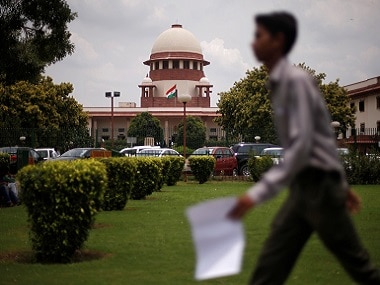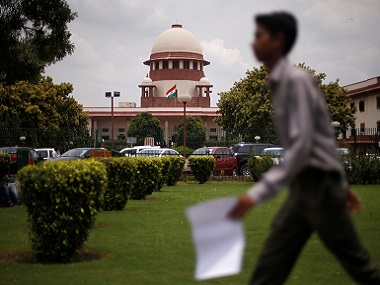New Delhi: The Supreme Court on Monday gave four more weeks to the Centre and 25 states to file responses on a plea seeking directions for setting up online RTI portals, enabling people to apply electronically for the information required instead of filing applications physically. [caption id=“attachment_7163691” align=“alignleft” width=“380”]  Representative image of Supreme Court of India. Reuters[/caption] A bench of justices NV Ramana, Sanjiv Khanna and Krishna Murari expressed displeasure that though the apex court had issued a notice to the Centre and states on the petition on August 26, they have not filed their responses yet. The top court, while giving four more weeks for filing a response, made it clear that no further adjournment would be given in the matter. The bench was hearing a PIL, filed by Delhi-based NGO ‘Pravasi Legal Cell’, which has said the Right to Information (RTI) Act is a “powerful tool” and its true objective could be achieved only by the timely response to citizens’ request. The plea said the Centre has established an online RTI portal in which any Indian citizen, including NRIs, can apply for information under the RTI Act with the desired ministry or department. It said the Centre in December 2013 had requested the state governments to explore the feasibility of implementing online RTI in their respective states but only Maharashtra and Delhi have established portals for that. “Online web portal will only help the Indian citizens including the Non-Resident Indians (NRIs) by speedy dissemination of information requested which in turn would only help in achieving the aim of the RTI laws of bringing transparency in administration,” it said. “The RTI Act is a powerful tool in the hands of Indian citizens and the true objective of the legislation can be achieved only by the timely response to citizens’ request for government information which can only be achieved by making the entire application as well as appeal process online,” it said. The plea has said in cases of NRIs, the present system of physical RTI applications makes it difficult, inconvenient, costly and attributes long delays in providing the desired information under the Act “which defeats the letter and spirit of the legislation”.
Supreme Court on Monday gave four more weeks to the Centre and 25 states to file responses on a plea seeking directions for setting up online RTI portals.
Advertisement
End of Article


)

)
)
)
)
)
)
)
)



